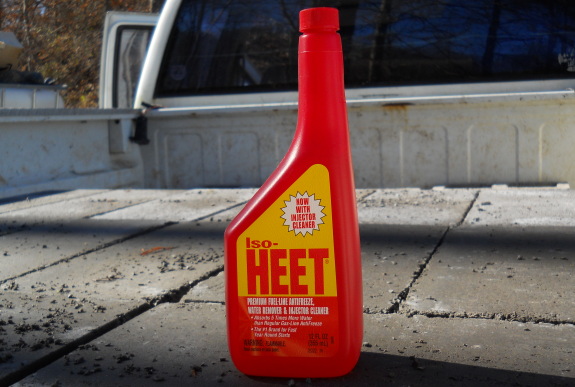
Getting started on a cold morning

We had some trouble getting
the truck started last week during a very cold morning.
It turned over fine but kept
stalling out.
The problem was more than
likely some water in the fuel. I added the above bottle of HEET,
waited about an hour and it started right up. The instructions
recommend adding a bottle every time you fill up when it's cold out and
I think I might just start doing that to avoid any future cold starting
issues.
Want more in-depth information? Browse through our books.
Or explore more posts by date or by subject.
About us: Anna Hess and Mark Hamilton spent over a decade living self-sufficiently in the mountains of Virginia before moving north to start over from scratch in the foothills of Ohio. They've experimented with permaculture, no-till gardening, trailersteading, home-based microbusinesses and much more, writing about their adventures in both blogs and books.
Want to be notified when new comments are posted on this page? Click on the RSS button after you add a comment to subscribe to the comment feed, or simply check the box beside "email replies to me" while writing your comment.

Just my opinion. I've had to use heet about 15 times in my 36 year old life. It's great and I love the product, but I don't you'll need to add it in every tank.
My totally unscientific experience has been thus: when I'm having trouble starting a car, but it cranks good and I have good spark, I add heet. Boom, it starts. In one particularly heinous event where a jackass added a bottle of beer to my gas tank(I found out about this later) it took 2 bottles and 1 fuel filter change. I now suspect that the 2 bottles of heet may have actually been enough to fix it, but again I have no proof.
This stuff is almost pure isopropyl alcohol ("IPA"). It works by making the water in the tank and fuel lines soluable in gasoline. If you buy pure (99%) IPA, I think it would work just as well, and is a lot cheaper. On Amazon, iso-heet goes for $8.27 for 12 fl.oz. 99% IPA is only $2.42 for 16 fl.oz.
@zimmy: Make sure that it's not isopropyl rubbing alcohol. That can contain a lot of water and other stuff.
@mark: The cleaning additives used to clean injectors don't need to be applied that often. My car gets a dose of the stuff during the yearly check-up. It's now 15 years old and hasn't failed to start yet.
First of all I am going to make a disclaimer, am not an expert in fuel or cars, but I have listened to some and so thought I would spread their message and then direct you to them to learn more. So Mark, I know you are an inventor and so I thought you would like to know this. My understanding, as others started to point out, is that Iso-Heet is just ethanol or 95% pure alcohol. In addition, I don’t believe you need 95% to clean up the water, I believe you could do the same thing with some E85 gasoline, though I don’t know if it is cheaper. The other solution is that you could distill your own, which is perfectly legal if you get a fed permit – free, and “only” use it for fuel. I think I have rambled enough now, the source of this info is Steven Harris, I learned about him from the Survival Podcast. I would suggest you check out both websites if you haven’t already.
P.S. I don’t know how much Steven Harris is willing to share, but he is working on inventing a method of distilling alcohol without any, direct energy, using chemicals and substances that could be reused over and over again. Thought this might get your inventor hat interested. I hope you and Anna will check it out and as always love the site and when I afford the upgrade I will be buying some of your chicken watering devices, I hate cleaning dirty water containers.
The cheapest alternative I've found for frozen fuel lines is methyl hydrate (wood alcohol). It's commonly sold as gas line anti-freeze in small bottles at the gas station. For the cost of one small bottle you can buy a full liter of methyl hydrate from the paint section of your local hardware store. Sometimes if you shop around you can find a gallon jug for the same price. Truckers use MH in the air brake lines to keep them from freezing as well.